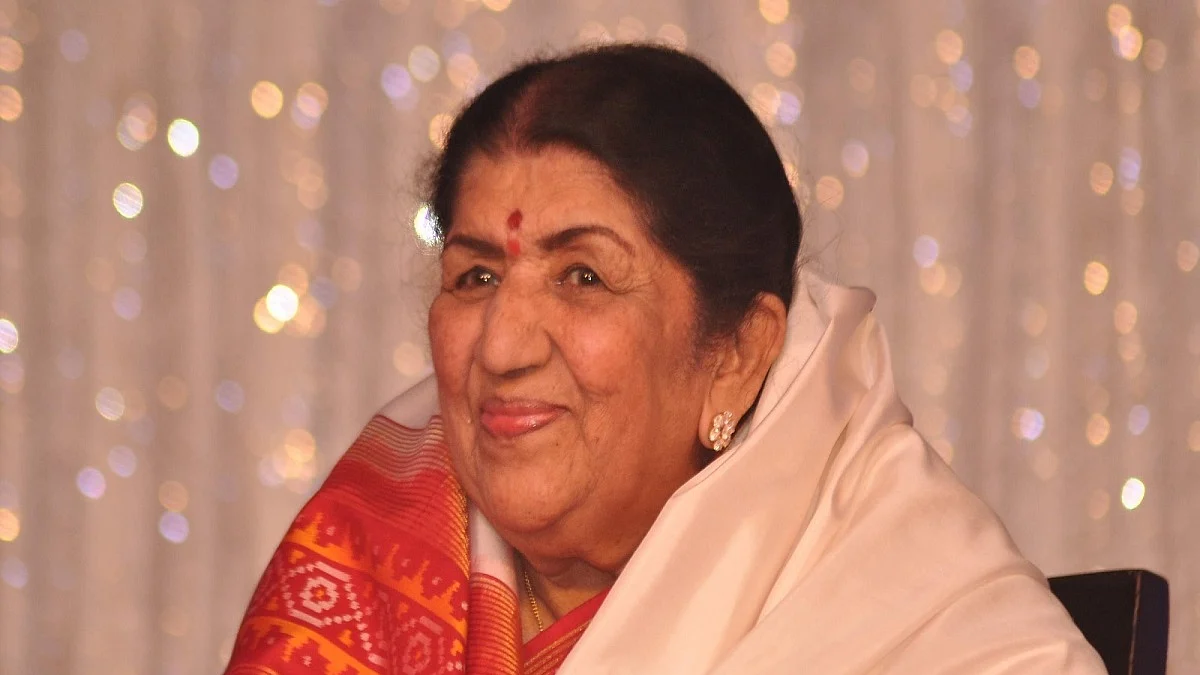Bollywood Baatein: When I met the goddess for first time
“I’ve never stopped to admire any of my songs. An artiste should never be satisfied with what he or she does. There should always be hunger to excel,” Lataji once said

As she recuperates slowly but surely, I recall my first encounter with Lata Mangeshkar which is still vividly etched in my memory.
From the age of six, I’ve believed that divinity dwells in her throat. I still do. For years I wondered what she was like in person. Or did she even exist? In 1995, a mutual friend set up an appointment with her at the Shiv Sena Bhavan where she was rehearsing for a concert. I couldn’t believe my luck. But she was unwell, and had to miss our appointment. I consoled myself saying it was not meant to be. But the very next day, she was there in front of me: frail, warm... and real. She was full of jokes.
Since then, I’ve come to know one truth about the lady -- humility comes naturally to her.
In 1999, when Lataji missed out on the Bharat Ratna in favour of Pandit Ravi Shankar, I commented on the unfairness of Bharat’s real ratna being denied the highest civilian honour. Lataji admonished me, “You might think I am a big talent. But Panditji is far bigger than I have been or can ever hope to be. I still remember how nervous and excited I was when I had to sing his compositions in Anuradha. I kept wondering whether I would do justice to the creations of an artiste as great as him.
Artistes like Pandit Ravi Shankar and Ustad Bismillah Khan come once in a century. They deserve to be honoured far more than I do.”
Of course, Panditji’s creations in Anuradha, like ‘Kaise din beete…’ and ‘Hai re woh din…’ attained new heights when Lataji sang them. When Panditji tried to recreate the same magic with another voice (Vani Jairam) in his score for Gulzar’s Meera, the compositions fell flat.
There was a time when composers like S.D. Burman and Madan Mohan waited months to get her to sing.
How did she assess her own career as a singer? “I’ve never stopped to admire any of my songs, ‘Wah wah kya gaana gaya hai’. But I know what you don’t. I know the places where I’ve made mistakes in my songs. An artiste should never be satisfied with what he or she does. There should always be hunger to excel.”
Ok, so which is the song that has given Lataji maximum satisfaction? “The songs that I sang for my brother (Hridayanath Mangeshkar) in the album of Meerabai bhajans ‘Chala Vahi Des…’. I always feel that I’ve done justice to whatever Hridayanath gave me to do in. It has been my most successful endeavour to date. I’ve also done justice to some of the compositions by Salilda (Chowdhury), Madan Mohan and Jaidev.
“Jaidev was the most challenging among the composers. He had a sound knowledge of classical music. He would say, ‘I’ve told her what to do. Now I don’t need to worry.’ Once he composed a song he left it to me to worry about it. It became my responsibility. And I’d be endlessly worried. I remember he had composed a Nepali song for me written by the King of Nepal King Birendra (Jun Mato Na Mero in the Nepali film Maatighar). It was one of the toughest songs of my career.”
It is often said that composers like Shankar-Jaikishan and Laxmikant-Pyarelal made Lataji sing songs at an unnecessarily high pitch just because she has the range? “This is true. I’ll give you two examples. ‘Ehsaan tera hoga mujh par…’ in Junglee and ‘O mere shah-e-khuba…’ in Love In Tokyo, both composed by Shankar-Jaikishan. Both the songs were first sung by Mohammed Rafi sahab.
“Then they decided they wanted the same songs sung by me. They came to me after filming the songs with the leading ladies of the two films, Saira Banu in Junglee and Asha Parekh in Love In Tokyo, in the voice of Rafi sahab. I was asked to sing the songs exactly the same way, since it was already shot with the heroines in Rafi Saab’s voice.
“I wasn’t allowed to lower the scale of the original tunes since it was already filmed. So, I had no choice but to sing in Rafi saab’s pitch. I remember how difficult it was for me, and I was very upset with Shankar-Jaikishan for making me do this.”
Lataji once made a startling declaration to me. “Shall I tell you something? It is much more difficult to do playback singing for films than to sing classical vocals. When you are doing classical vocals there is room for improvisation. But when you do playback singing you have to go exactly by the requirements of the character on screen. I used to find out what the heroine was supposed to be doing, why was she singing the song, etc. Playback singing requires tremendous amounts of precision in rendering the lyrics and tune.”
(This article was first published in National Herald on Sunday)
Follow us on: Facebook, Twitter, Google News, Instagram
Join our official telegram channel (@nationalherald) and stay updated with the latest headlines
Published: 23 Jan 2022, 9:15 AM